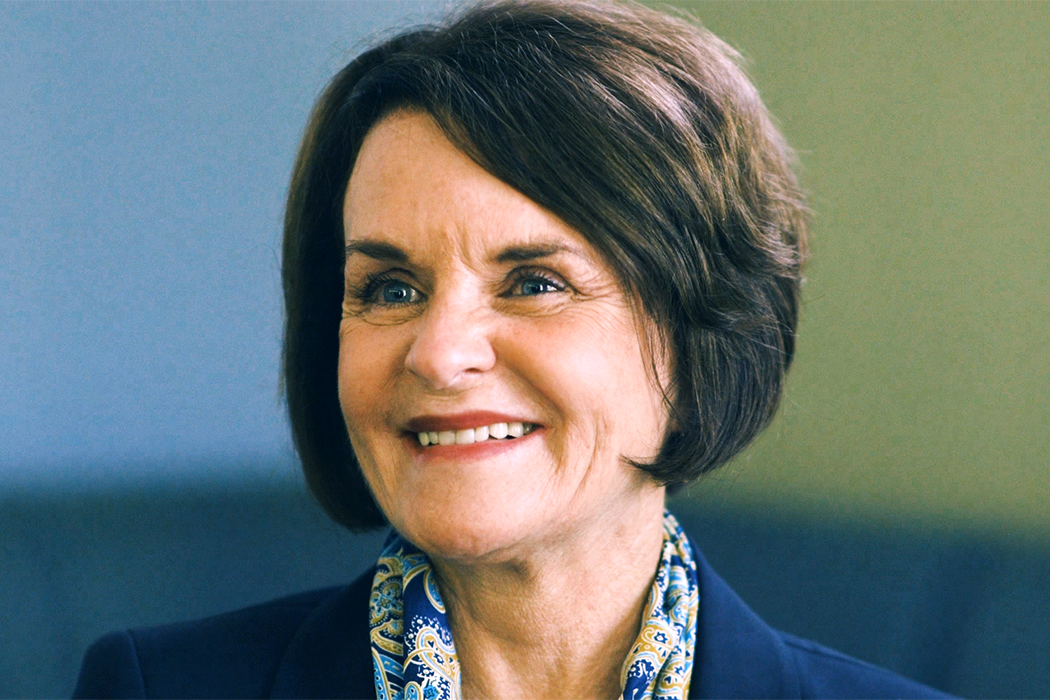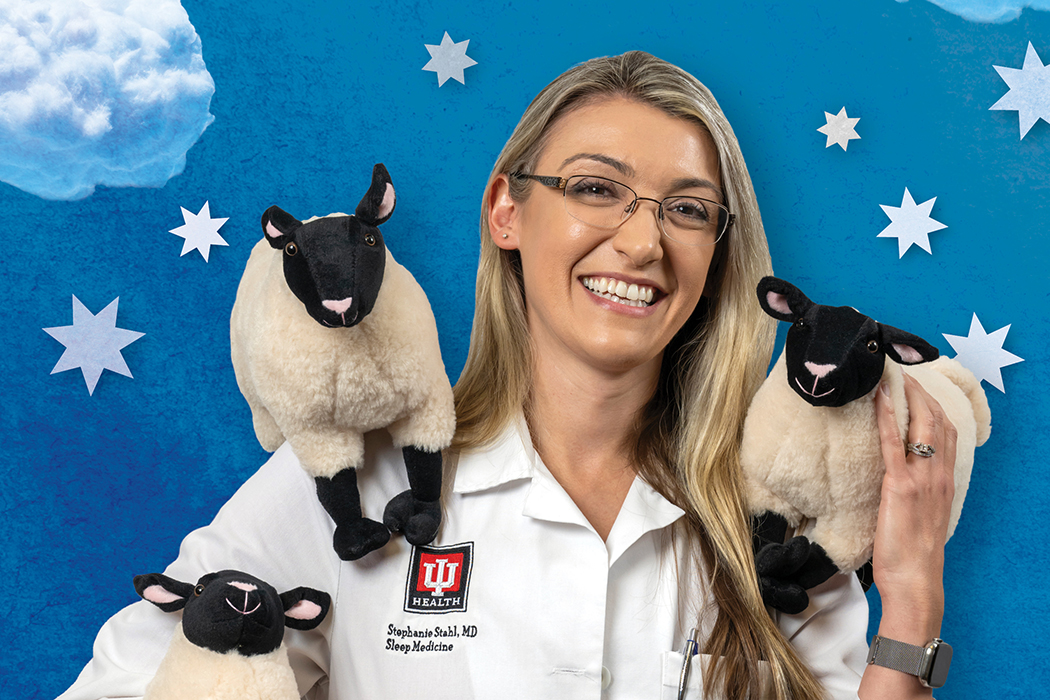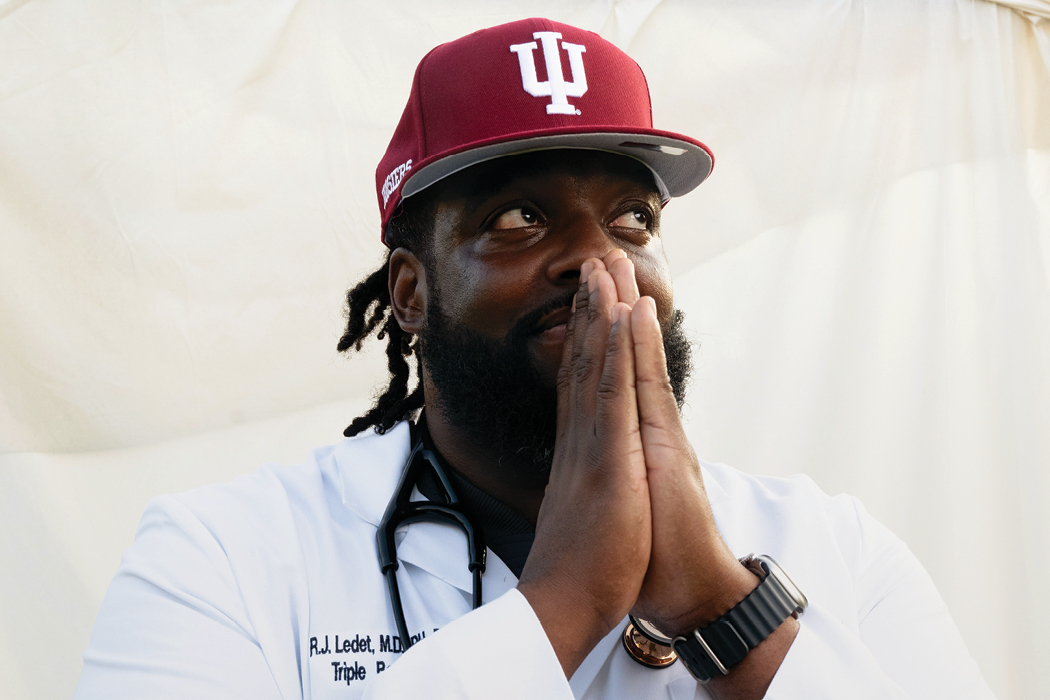All-Around Champion

In early 2019, on the eve of a national preventive oncology conference in Tampa, Fla., Victoria Champion, BSN’70, MSN’75, PhD’81, was among a group of accomplished researchers who gathered at the home of one of her first mentees, Usha Menon, MSN’96, PhD’00, now interim dean and vice dean of research at the College of Nursing at the University of South Florida. In the midst of socializing, the women soon discovered that each of them had a tie to Champion. Directly or indirectly, they had all been mentored by her.
Over the past 25 years, Champion’s mentoring network has played a principal role in securing funded research in cancer prevention, with program researchers—including several from the IU School of Nursing—responsible for bringing the university millions of dollars in peer-reviewed funding from the NIH and other public and private sources.
In countless ways, her life’s work is defined not only by what she has personally achieved but also by her widespread impact. In addition to the colleagues and students she’s trained and the impact she’s had on research funding, Champion has pushed the boundaries of technology-driven interventions to develop novel programs that have helped thousands of people get lifesaving breast and colon cancer screenings.

While Champion shows few signs of slowing down, her legacy is already taking shape with the formation in fall 2016 of the Champion Center for Cancer Control Research at the IU School of Nursing.
“Vickie’s research has informed standards of care, provided tools to increase cancer screening, and helped countless people prevent and recognize cancer early,” says Robin Newhouse, dean of the IU School of Nursing. “Our vision for the Champion Center is to build on three decades of leadership to foster and enable rigorous science, support cancer-focused researchers, and train the next generation of cancer control scientists.”
Champion’s methods and tools have been adapted by fellow researchers to promote preventive screening and early detection of other cancers, and they have been used in communities and among underserved populations in the United States and around the world. During her career, she also branched out into a second program of research focused on cancer survivorship.
“Vickie is on the cutting edge and has been for a very long time, and that’s the research that gets funded,” says Joan Austin, MSN’78, PhD’81, distinguished professor emeritus at the IU School of Nursing and a consultant for the NIH’s National Institute for Nursing Research. “It’s very unusual for someone to be as successful as Vickie has, for as long as she has.”

Austin and Champion met as graduate students in a statistics course on IUPUI’s 38th Street campus in the late 1970s. Enrolled in the IU School of Nursing’s PhD program—one of the few programs of its kind in existence at the time—the two women began their doctoral training at the dawn of nursing science, when thought leaders were just beginning to carve out a definition for nursing research. In 1981, Austin and Champion were among the first to graduate with doctoral degrees in nursing from IU. As trailblazers for IU nursing research, Champion and Austin, whose work focused on epilepsy, benefited from the research infrastructure then being built by IU School of Nursing’s first dean of research, Angela Barron McBride, DSc’14, who went on to serve as the school’s dean from 1991 to 2003.
It was McBride who encouraged Austin and Champion to collaborate in 1999 on the application for IU School of Nursing’s first “P30,” an NIH grant that provides core support for multidisciplinary research centers. They earned the grant, which funded pilot research studies for five investigators and paved the way for the creation of the School of Nursing’s highly successful Center for Enhancing Quality of Life in Chronic Illness (CEQL), which has supported 27 principal investigators and more than 30 pilot research studies since 2000.
“Vickie sees an issue and tackles it—she’s not intimidated and isn’t put off by not getting something the first time. She just has a tremendous amount of persistence,” Austin says.
Research fuels desire to ask ‘why’
Growing up on her family’s farm near Crawfordsville, Ind., Champion arrived at the IU School of Nursing in the late 1960s, bringing with her childhood memories of her mother, who was a nurse, and a propensity for asking a lot of questions.
“I’ve always been interested in understanding the ‘why’—it’s just part of my personality,” Champion says. “My first clinical professor told me I shouldn’t be a nurse because I questioned too much.”

Not someone who’s easily dissuaded, Champion graduated from IU in 1970 with a bachelor’s degree in nursing. She spent a year as a recovery room nurse before moving on to IU’s urology clinic, serving in positions of increasing responsibility while beginning work on a master’s degree. During those years, she also married and began raising a family. Her second of three children was just 3 years old when Champion earned her PhD.
While she enjoyed clinical care, Champion’s graduate degrees opened new doors—one was research, satisfying her yearning to ask questions, and better yet, to find answers. Initially, she drew from her own experiences of seeing patients with chronic illness develop acute health problems because they didn’t follow prescribed directions. While more education and instruction helped some patients, for many others, knowledge wasn’t enough.

“I began to realize I could use the holistic aspects of nursing, which always appealed to me, to learn more about what motivates people to engage in healthy behaviors,” Champion explains. “It’s here that we can have tremendous impact, especially when we now know that up to 75 percent of cancer mortality can be prevented if people engage in behaviors that decrease the risk of developing cancer in the first place.”
It’s the indisputable benefits of prevention and early detection that have powered Champion’s research efforts for the past 30-plus years. She has led other researchers along the same path, helping to ensure that people from all walks of life have the information and tools they need to make better decisions about their health.
“The best way to decrease the burden of cancer is to prevent it or catch it early to improve the chances of cure,” says Patrick J. Loehrer, IU distinguished professor and director of the IU Melvin and Bren Simon Comprehensive Cancer Center. “In that arena, Vickie has been a tremendous role model and mentor for researchers both here at IU and others in major leadership roles across the country. She has an extraordinary track record of helping her mentees get funded, and she takes pride in each one who has done well.”
‘She opens the world to you’
For more than a year after graduating with a PhD from IU School of Nursing, Usha Menon ended every presentation, regardless of the topic or where she was speaking, by thanking Victoria Champion. Menon knew even then the impact Champion had made on her life and career.

“So much of who and what I am today I owe to her in many ways,” says Menon, an internationally recognized researcher who has earned more than $60 million in grant funding. Her work focuses on early cancer detection in vulnerable populations. “It was a combination of me working, certainly, but I have friends and colleagues who have not made it to this level, and I think the difference is who mentored me.”
Menon enrolled in IU’s master of nursing program in 1995 and was planning to be a nurse practitioner when she met Champion. Just two years later, she was pursuing a PhD and preparing to defend her dissertation on colorectal cancer screening, with Champion as her advisor.
“Vickie’s the kind of person that if she sees you’re interested, she opens the world to you,” says Menon. “She saw the potential in me that even I didn’t see at the time.”
Mentoring has been a constant in every phase of Champion’s career. From the earliest days when she and Austin relied on each other to critique their proposals, Champion realized mentoring’s fundamental role in a world where grant writing is equal parts art and science.
“Vickie has never forgotten that when she began her research career there was neither the enthusiasm nor the infrastructure in place to help fledgling nurse scientists,” says McBride. “She doesn’t want any other student or junior faculty member to experience the struggle she faced when starting out.”
Referring to mentoring and research as “two inseparable components” of her responsibility as a faculty member, Champion has provided dissertation supervision to more than 40 PhD students. She’s served as research advisor to more than 25 pre- and post-doctoral fellows and has mentored, both formally and informally, countless other researchers, including several physician colleagues.
“Mentoring is a little like mothering,” Champion says. “You bring new researchers in and you help them learn, and it gets to the point when you feel prouder of their success than your own.”
Creating a lasting impact
Champion has always viewed mentoring as an advantage for anyone regardless of age, experience, or number of grants earned or articles published. In fact, her belief in mentoring likely grew out of her own need for it. Although Champion earned her first two NIH grants without the customary request to revise and resubmit, she was keenly aware from the beginning that in order to advance her research she’d need help. Continuous improvement has been a recurring theme throughout Champion’s career, which she recently summed up by saying, “Your work is only as good as what it continues to produce and build.”
“Dr. Champion has demonstrated persistence in always wanting her work, and the work of others, to get better,” McBride explains. “More than most other researchers, she seeks feedback, and she has consistently built feedback into her timelines for revision, which I think has contributed to her impressive success in winning grants.”

In 1996, supported by funding from the Walther Cancer Institute, Champion founded the first of two successful and highly productive mentoring networks, the Behavioral Cooperative Oncology Group. A collaborative research organization, BCOG brought together behavioral oncology scientists from Indiana University, the University of Michigan, Michigan State University, Ohio State University, and Duke University.
“BCOG was first developed because at the time I was the only funded behavioral oncology researcher on the IUPUI campus,” Champion explained. “Realizing that our IU nursing mentees needed other senior mentors, I started BCOG to extend our training and research capabilities.”
The mission of BCOG was to mentor senior, mid-level, and junior faculty, as well as pre- and post-doctoral fellows, and to encourage the development of interdisciplinary research. Fellows were assigned to a senior researcher at one of the participating universities for primary mentoring, and presented their proposals for peer review by BCOG’s senior scientists at the collaborative’s biannual conferences.
Michigan State University’s Barbara and Charles W. “Bill” Given were two of the researchers Champion reached out to as BCOG was forming. Beginning in 1995, she collaborated with the Givens, already well-funded researchers in their own right, on cancer survivorship studies, testing interventions designed to alleviate symptoms resulting from cancer and cancer treatment.
“BCOG was a truly collaborative environment that enriched our ability to pursue the science because we had a group of high-energy faculty who respected each other and offered support,” says Bill Given. “Being part of that group was really the highlight of our career. It was just very special.”
“When we’d get together with Vickie, it was a blue sky of possibilities all the way; we’d leave a room after three or four hours of brainstorming with her and feel energized by all that we could accomplish,” Barbara Given adds.
At IU, Champion structured a similar mentoring collaborative, tilling the ground of scientific inquiry for the growing number of behavioral oncology researchers on the IUPUI campus. Her biweekly mentoring meetings have provided an invaluable forum for young faculty, postdocs, and students in a variety of disciplines to gather feedback from experienced researchers on everything from ideas for pilot studies to grant proposals requiring resubmission.

When the IU Simon Cancer Center was established in 1992, Champion was named its first leader of cancer prevention and control. And today—largely thanks to the millions of research funding she helped secure throughout her career—the IU Cancer Center has the largest group of cancer prevention and control researchers in the nation.
In August 2019, the IU Simon Cancer Center was awarded the National Cancer Institute’s highest designation—Comprehensive Cancer Center. With this recognition, the center becomes the only NCI-designated Comprehensive Cancer Center in Indiana and one of just 51 across the United States. As the center’s associate director of community outreach and population science research, Champion was a key contributor to the 1,700-page application submitted to the NCI.
“Vickie’s work was instrumental in securing the comprehensive status from the NCI,” says Loehrer. “It’s an incredibly important accomplishment for IU and our cancer center, and it would not have happened unless we performed well in our population science and cancer control efforts.”
Continuing a rich legacy of research
Published widely in respected nursing and interdisciplinary journals, Champion has acquired a curriculum vitae that spans nearly 60 pages. She has been cited in 26,557 publications and served as a presidential appointee on the National Cancer Institute’s Advisory Board, a body that approves all funding and policies of the largest institute at the NIH. She also was instrumental in establishing the Indiana Cancer Consortium, a group of 150 organizations dedicated to decreasing cancer morbidity and mortality in the Hoosier state.

A standout in the relentlessly challenging world of academic research, Champion has thrived in an intensely competitive funding environment. Of the more than 52,000 grant applications submitted to the NIH each year, only about 18 percent are funded, with approximately 90 percent of the funds going to support basic science research—not the behavioral research that Champion helped to pioneer.
Thanks to Champion and other IU faculty at the forefront of nursing research, a firm foundation has already been laid. With 11 nurse scientists currently pursuing cancer-related research, IU School of Nursing boasts the largest number of oncology-focused research faculty in the nation.
But for Champion, 35 years of scientific inquiry and research mentorship boil down to these enduring aims: saving lives and ensuring others continue the work.
“Fifteen years ago, I enrolled in my cancer screening study a 52-year-old woman who had never had a mammogram even though her mother died of breast cancer at age 55,” Champion said in her remarks when the center bearing her name was announced. “After participating in the intervention arm, she decided to have a mammogram, and breast cancer was discovered. She is alive today. The work of research is not easy. It takes passion, sacrifice, persistence in the face of failure, and the ability to work today for a future we can only envision.”
Tags from the story
Written By
Jill Jansen



